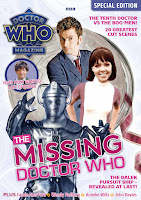You can now download for free the four-page postscript to my biography of David Whitaker, detailing some of the things I've learned since the book was published last November.
The postscript is included in The Who Shop's exclusive paperback editions of the book, and will be added to future versions of the standard paperback at some point.
To accompany the release of the postscript yesterday, I posted a thread to both X (formerly Twitter) and BluSky, and here it is in full:
 |
| Terry Nation and pals at Lynsted Park, source |
Writer and Dalek creator Terry Nation was born on 8 August 1930. OTD in 1964, he hosted a big birthday party at his newly acquired home, Lynsted Park — an Elizabethan mansion in Kent.
You can watch footage of Nation interviewed at home by Alan Whicker in 1967 on the BBC website. But my interest is in that party.
This party haunts my imagination, symbolic of Nation becoming a big showbiz success story after years of toil in light entertainment.
But, like most of these things, the more I’ve looked into it, the richer and stranger the story gets.
I wonder about the logistics. Did Nation provide everyone’s drinks? Was good laid on as well? Given Lynsted Park was quite remote, was there a lot of drink-driving back to London?
But also, who was at this party? While in the Doctor Who production office, Nation sent an invite to actress Carole Ann Ford. (The office kept a copy: Nation to Ford, 31 July 1963, WAC T5/648/2 General)
Nation was at the time hard at work writing The Dalek Invasion of Earth, the serial that would see Ford leave Doctor Who after a year playing the Doctor’s granddaughter Susan.
On the DVD / Blu-ray commentary for The End of Tomorrow (the fourth episode of The Dalek Invasion of Earth), Ford and her colleagues recall Nation’s lavish birthday bash.
In fact, Ford remembered that Nation’s grand new house was in a bit of a state. In particular, she recalled that the swimming pool couldn’t be used; it was full of rubbish.
Co-star William Russell said Nation told him that he hadn’t bought the house because he was suddenly rich from inventing the Daleks (whose debut story had concluded earlier that year).
Instead, Nation said he’d taken out an ‘enormous mortgage’ as a spur to keep busy writing. It was a means to success, rather than a marker of success having been accomplished.
Who else was at the party? Given that Ford and Russell were there, Nation probably invited Doctor Who’s other stars — William Hartnell and Jacqueline Hill.
Hill’s husband Alvin Rakoff told me he remembered going to Lynsted Park but wasn’t sure if it was for this particular party.
Producer Verity Lambert also remembered being at the party, according to the DVD/Blu-ray commentary.
Nation’s invitation to Ford said story editor David Whitaker could help her find the house, implying Whitaker was there, too.
At the time, Whitaker was working with Nation on the new Dalek TV story. They were also co-writing The Dalek Book for publication in September. (And Whitaker was novelising the first Dalek TV story.)
Given all these Doctor Who luminaries at the party, they surely tuned in to watch that evening’s episode — the first instalment of The Reign of Terror by Dennis Spooner.
(To this, my esteemed publisher Stuart Manning added: "Hazel Peiser, the partner of would-be Doctor Who Meets Scratchman director James Hill, recalls attending a party at Nation's mansion where the guests watched Doctor Who go out on TV. James was working on The Saint around that time, so it probably checks out.")
Spooner shared an agent with Nation, who’d recommended him to Whitaker. Two days before the party, it was confirmed that Spooner would join the BBC staff to shadow then succeed Whitaker.
The chances are that Spooner was at the party, too. In his biography of Nation, Alwyn Turner says Roger Moore also attended *one of* Nation’s parties at Lynsted Park, wearing a blue jumpsuit.
I like to imagine them all there together: the current Doctor Who, the future James Bond plus Jackie Hill — who was responsible for Sean Connery’s first big break. For more on the latter, see my post on I’m Just the Guy Who Says Action, by Alvin Rakoff.
At the time of the party, Moore was the star of The Saint, for which Nation wrote (for higher fees than Doctor Who). A week after the party, Whitaker met Saint script supervisor Harry Junkin.
A week later, Whitaker met with Leslie Charteris, creator of The Saint, to discuss a potential musical. Nothing came of these meetings but they were surely instigated by or through Nation.
(Whitaker refers to both meetings in letter to his new agent, Beryl Vertue, at Associated London Scripts, on 14 August 1964, a copy held in Doctor Who production file WAC T5/648/2 General)
In throwing the party and in putting Whitaker and Spooner up for potential jobs, Nation was sharing his largesse. He could afford to be generous — couldn’t he?
As I imagine that party, I wonder what was going through Nation’s mind and how much he felt able to enjoy it himself. He’d certainly had a good few months since the debut of the Daleks.
‘The Daleks have transformed Mr Nation’s life,’ reported Andrew Duncan in Women’s Mirror just over a year later on 30 October 1965, ‘and he could eventually make £1 million from them.’ (NB, he hadn’t yet.)
Then Duncan quoted Nation’s own insecurities about this success. ‘I’ve got this enormous fear that one day a man is going to come and take back all the money.’














